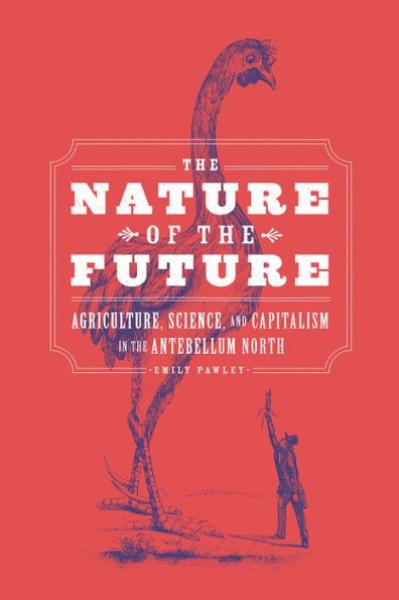Description
The nostalgic mist surrounding farms can make it hard to write their history, encrusting them with stereotypical rural virtues and unrealistically separating them from markets, capitalism, and urban influences. The Nature of the Future aims to remake this staid vision. Emily Pawley examines a place and period of enormous agricultural vitality--antebellum New York State--and follows thousands of "improving agriculturists," part of the largest, most diverse, and most active scientific community in nineteenth-century America. Pawley shows that these improvers practiced a kind of science hard for contemporary readers to recognize, in which profit was not only a goal but also the underlying purpose of the natural world. Far from producing a more rational vision of nature, northern farmers practiced a form of science where conflicting visions of the future landscape appeared and evaporated in quick succession. Drawing from environmental history, US history and the history of science, and extensively mining a wealth of antebellum agricultural publications, The Nature of the Future uncovers the rich loam hiding beneath ostensibly infertile scholarly terrain, revealing a surprising area of agricultural experimentation that transformed American landscapes and American ideas of expertise, success, and exploitation.
"In the seemingly mundane Northern farm of early America and the people who sought to improve its productivity and efficiency, Emily Pawley finds a world rich with innovative practices and marked by a developing interrelationship between scientific knowledge, industrial methods, and capitalism. Agricultural "improvers" became increasingly scientistic, driving tremendous increases in the range and volume of agricultural output-and transforming American conceptions of expertise, success, and exploitation. Pawley's focus on soil, fertilizer, apples, mulberries, agricultural fairs, and experimental stations shows each nominally dull subject to have been an area of intellectual ferment and sharp contestation: mercantile, epistemological, and otherwise"--
"The Nature of the Future is a crisply written and lively account of agricultural improvement in the antebellum Northeast. Come for the mammoth squashes, drunken plants, and butter battles; stay for the incisive and illuminating history, brilliantly told."--Wendy A. Woloson, author of Crap: A History of Cheap Stuff in America
"In this book, Pawley deftly hands us invention, experimentation, evidence, truth . . . and mulberries. In nineteenth-century bookkeeping of field nutrients, raucous debates over apple varieties, and Thoreau's sarcasm, she discovers the science, economics, and commercial imagination that shaped American farming and our modern meals. The writing is a delight--insightful, sure, and often funny. The Nature of the Future will be of keen interest to historians of capitalism, place, and food--and to anyone helping chart our environmental present."--Conevery Bolton Valencius, author of The Lost History of the New Madrid Earthquakes
"Pawley shatters historians' preconceptions about who and what belong in the histories of science and capitalism. Even the animals, plants, and soils have captivating pasts. Vivid and witty, this book rewrites the history of the early US from the perspective of those who fed it."--Jessica M. Lepler, author of The Many Panics of 1837
"In the seemingly mundane Northern farm of early America and the people who sought to improve its productivity and efficiency, Emily Pawley finds a world rich with innovative practices and marked by a developing interrelationship between scientific knowledge, industrial methods, and capitalism. Agricultural "improvers" became increasingly scientistic, driving tremendous increases in the range and volume of agricultural output-and transforming American conceptions of expertise, success, and exploitation. Pawley's focus on soil, fertilizer, apples, mulberries, agricultural fairs, and experimental stations shows each nominally dull subject to have been an area of intellectual ferment and sharp contestation: mercantile, epistemological, and otherwise"--
"The Nature of the Future is a crisply written and lively account of agricultural improvement in the antebellum Northeast. Come for the mammoth squashes, drunken plants, and butter battles; stay for the incisive and illuminating history, brilliantly told."--Wendy A. Woloson, author of Crap: A History of Cheap Stuff in America
"In this book, Pawley deftly hands us invention, experimentation, evidence, truth . . . and mulberries. In nineteenth-century bookkeeping of field nutrients, raucous debates over apple varieties, and Thoreau's sarcasm, she discovers the science, economics, and commercial imagination that shaped American farming and our modern meals. The writing is a delight--insightful, sure, and often funny. The Nature of the Future will be of keen interest to historians of capitalism, place, and food--and to anyone helping chart our environmental present."--Conevery Bolton Valencius, author of The Lost History of the New Madrid Earthquakes
"Pawley shatters historians' preconceptions about who and what belong in the histories of science and capitalism. Even the animals, plants, and soils have captivating pasts. Vivid and witty, this book rewrites the history of the early US from the perspective of those who fed it."--Jessica M. Lepler, author of The Many Panics of 1837
Last updated on
Product Details
- University of Chicago Pre Brand
- Apr 6, 2020 Pub Date:
- 022669383X ISBN-10:
- 9780226693835 ISBN-13:
- 312 Pages
- 8.9 in * 6.2 in * 1.1 in Dimensions:
- 1 lb Weight:




